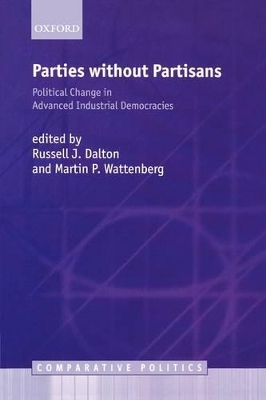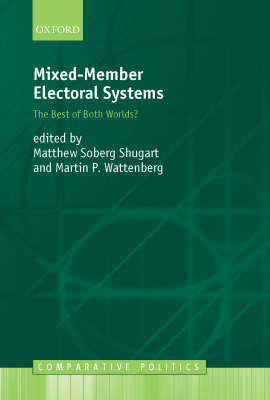Comparative Politics
2 total works
If democracy without political parties is unthinkable, what would happen if the role of political parties if the democratic process is weakened? The ongoing debate about the vitality of political parties is also a debate about the vitality of representative democracy. Leading scholars in the field of party research assess the evidence for partisan decline or adaptation for the OECD nations in this book. It documents the broadscale erosion of the public's partisan
identities in virtually all advanced industrial democracies. Partisan dealignment is diminishing involvement in electoral politics, and for those who participate it leads to more volatility in their voting choices, an openness to new political appeals, and less predictablity in their party
preferences. Political parties have adapted to partisan dealignment by strengthening their internal organizational structures and partially isolating themselves from the ebbs and flows of electoral politics. Centralized, professionalized parties with short time horizons have replaced the ideologically-driven mass parties of the past. This study also examines the role of parties within government, and finds that parties have retained their traditional roles in structuring legislative action
and the function of government-further evidence that party organizations are insulating themselves from the changes transforming democratic publics. Parties without Partisans is the most comprehensive cross-national study of parties in advanced industrial democracies in all of their forms - in
electoral politics, as organizations, and in government. Its findings chart both how representative democracy has been transformed in the later half of the 20th Century, as well as what the new style of democratic politics is likely to look like in the 21st Century.
identities in virtually all advanced industrial democracies. Partisan dealignment is diminishing involvement in electoral politics, and for those who participate it leads to more volatility in their voting choices, an openness to new political appeals, and less predictablity in their party
preferences. Political parties have adapted to partisan dealignment by strengthening their internal organizational structures and partially isolating themselves from the ebbs and flows of electoral politics. Centralized, professionalized parties with short time horizons have replaced the ideologically-driven mass parties of the past. This study also examines the role of parties within government, and finds that parties have retained their traditional roles in structuring legislative action
and the function of government-further evidence that party organizations are insulating themselves from the changes transforming democratic publics. Parties without Partisans is the most comprehensive cross-national study of parties in advanced industrial democracies in all of their forms - in
electoral politics, as organizations, and in government. Its findings chart both how representative democracy has been transformed in the later half of the 20th Century, as well as what the new style of democratic politics is likely to look like in the 21st Century.
Mixed-member Electoral Systems
by Martin P. Wattenberg and Matthew Soberg Shugart
Published 1 May 2001
Mixed-member electoral systems may well be the electoral reform of the 21st century, much as proportional representation (PR) was in the 20th century. In the view of many electoral reformers, mixed-member systems offer the best of both the traditional British single-seat district system and PR systems. This book seeks to evaluate: why mixed-member systems have recently appealed to many countries with diverse electoral histories; and how well expectations for these systems have been met. Each major country which has adopted a mixed system has two chapters in this book, one on origins and one on consequences. These countries are Germany, New Zealand, Italy, Israel, Japan, Venezuela, Bolivia, Mexico, Hungary, and Russia. In addition, there are also chapters on the prospects for a mixed-member system being adopted in Britain and Canada, respectively. The material presented suggests that mixed-member systems have been largely successful thus far. They appear to be more likely than most other electoral systems to generate two-bloc party systems, without in the process reducing minor parties to insignificance.
This book is intended for scholars and students of comparative politics, electoral studies and British politics
This book is intended for scholars and students of comparative politics, electoral studies and British politics

